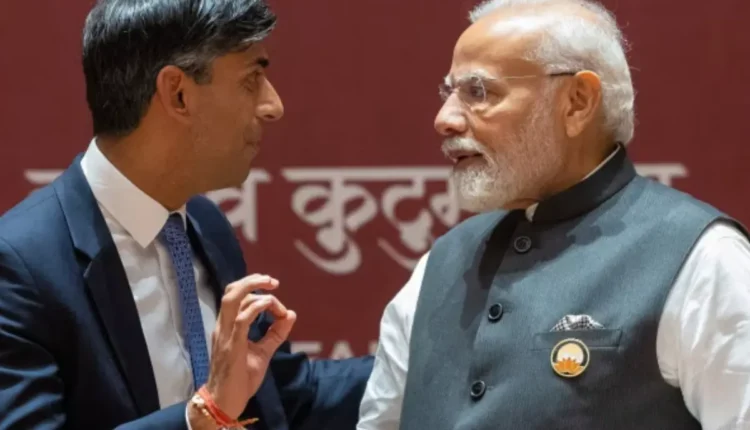Trade Deal Uncertainty: Rishi Sunak’s India Visit in Limbo
UK-India Trade Deal Stalled: Cricket World Cup Match in Doubt
Rishi Sunak’s aspiration of sealing a trade deal with India this month has started to fade, casting a shadow over the possibility of a historic agreement being signed on the margins of a critical match during the Cricket World Cup.
The buzz surrounding the trade talks is intensifying, with a lack of progress in opening Indian markets to British professional services, including law and accountancy firms, being cited as a key obstacle.
Trade Deal Updates
Downing Street and New Delhi had been exploring the prospect of UK Prime Minister Rishi Sunak‘s visit to India next week, potentially coinciding with a pivotal encounter between India and England in Lucknow on October 29.
However, British officials have now expressed scepticism about this visit, with one official stating, “The discussions are not where we want them to be.” Chancellor Sunak, during a recent G20 summit in Delhi, made it clear that he would not “rush” into a deal.
The Indian media had previously reported that a trade deal could be signed by the end of October, but negotiations appear to have hit a roadblock, primarily revolving around the issue of trade in goods and services, with Britain pushing for more favourable terms.
A UK government official emphasized that “the prime minister has said he will not sign a trade deal on arbitrary deadlines.” The emphasis remains on doing what is best for the country, even if it means patience and prudence in the negotiations.
A senior British official pointed out that India is facing difficulty distinguishing between what it “needs” and what it “wants,” cautioning against an undue focus on desires over essential needs, which could ultimately jeopardize the agreement.
The envisioned trade deal holds significant promise for both sides. Britain is hoping to open up trade avenues for whisky and automobiles in India, along with facilitating services and investment opportunities. On the other hand, New Delhi seeks improved access to its manufactured goods, services, and work visas.
This cautious approach comes in the wake of the controversial trade deal with Australia in 2021, where then-Trade Secretary Liz Truss was criticized for rushing the deal to have it signed ahead of a G7 summit. Chancellor Sunak has pledged not to replicate that haste and, instead, focus on securing a deal that benefits both nations.
Industry insiders familiar with portions of the agreement suggest that India is offering less access to professional services, including law and accounting, compared to other modern trade agreements, such as the one between the UK and Australia. The draft deal seems to lack groundbreaking provisions in areas like legal services, a concern echoed by those familiar with its content.
However, it’s acknowledged that extracting significant concessions in India’s sensitive regulatory system was always going to be challenging, particularly for international law firms that have historically faced restrictions.
The success of the trade deal, especially from the perspective of professional services firms, may hinge on broader issues affecting international business, including data and personnel movement restrictions, regulatory cooperation between both countries and safeguards for investors in cases of alleged asset confiscation, a recurring issue in past disputes involving companies like Cairn Energy and Vodafone.
While India has also been pursuing trade deal agreements with other countries, including the UAE and Australia, negotiations with Canada have stalled due to escalating political tensions.
Also Read : Vivek Gupta : Pioneering Indian Meat Industry

